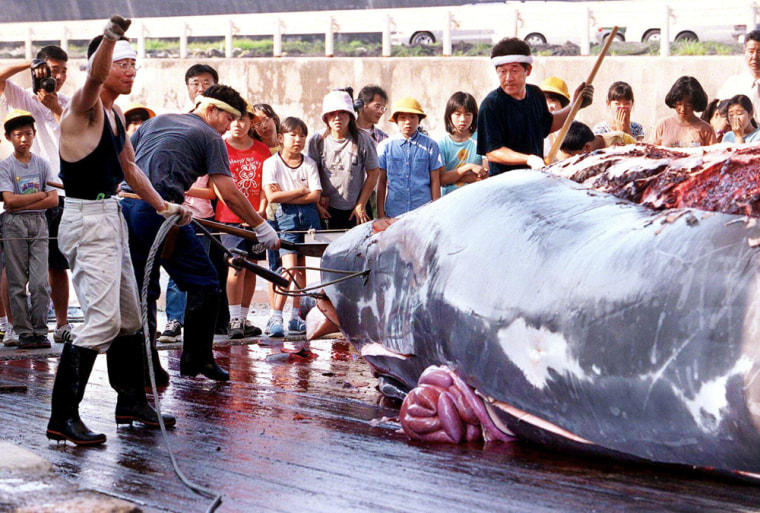The International Whaling Commission upheld its nearly two-decade-old ban on commercial whaling Tuesday, dealing a setback to Japan and other pro-whaling nations.
The panel voted 29-23 against lifting the ban. There were five abstentions, including countries that have often voted with Japan on other issues at the commission.
The 66-member commission, which regulates global whaling, banned commercial hunts in 1986, handing environmentalists a major victory in protecting the species near extinction after centuries of whaling.
Japan and its allies knew they had virtually no chance of getting the three-fourths majority needed to overturn the moratorium. But they had hoped to obtain a simple majority to back Japan’s proposal for a non-binding measure expressing support for limited commercial catches.
That would have demonstrated that opinion among commission members has turned in favor of sanctioning commercial whale hunts.
'Serious loss' seen for Japan
New Zealand Minister of Conservation Chris Carter, a delegate at the meeting, said his country was “absolutely delighted” with the vote. “This has been a very serious loss of face for Japan.”
Norway holds the world’s only commercial whaling season in defiance of the ban. Japan, Norway and other nations that advocate what they call “sustainable use” of whales are expected to kill more than 1,550 of the mammals this year.
On Monday, Japan said it would more than double its annual research cull of minke whales to as many as 935 from 440 this year, extending a researching whaling program begun in 1987. Critics call it commercial whaling in disguise.
Japan says it must kill whales to study them. It then sells the meat, which is allowed under commission rules. The United States criticized the decision to expand the research hunts, saying scientific advances make it unnecessary to kill whales to study them.
Japan defends whaling as a national tradition and a vital part of its food culture. It claims whale stocks have sufficiently recovered since 1986 to allow the resumption of limited hunts.
Countries led by Australia and New Zealand reject that view. They advocate protecting whales and encouraging alternative ways of profiting from them, through tourism and whale-watching.
Earlier votes
Japan’s proposals on deleting the issue of whale sanctuaries from the meeting’s agenda and introducing secret ballots were narrowly defeated Monday, but might have passed if several pro-whaling countries including the Pacific island nation of Nauru had arrived at the meeting on time.
The annual meeting went into a closed session for about 90 minutes Tuesday in what critics blasted as a delay tactic until more members who back the resumption of commercial whale hunts could arrive.
Members voted 28-20, with nine abstentions, in favor of the closed-door session as proposed by St. Lucia, one of several Caribbean countries in the pro-whaling camp.
Some participants evidently were frustrated that debate was being stalled; Brazil walked out of the closed meeting and accused pro-whaling countries of making long speeches on procedural issues.
“We just refuse to be taken hostage of rhetoric for unclear purposes,” Brazil’s representative Maria Teresa Mesquita Pessoa said.
